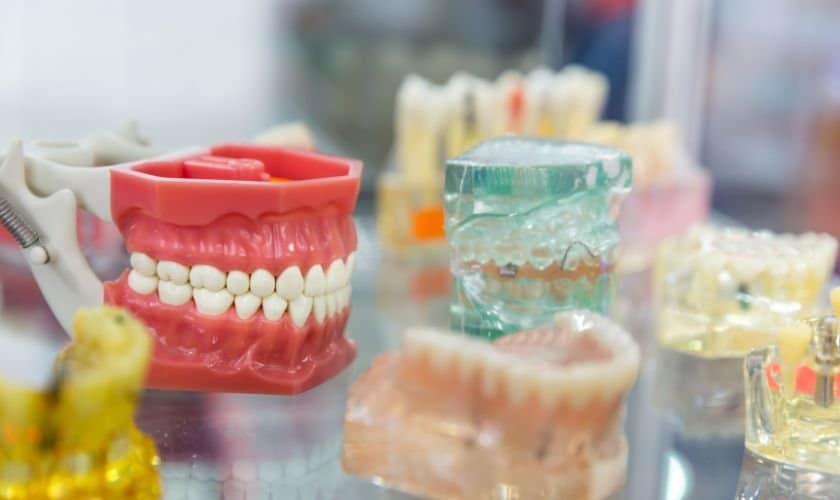
Are you afraid of sleeping with your dentures on? Do you wonder if it’s safe or if it could cause any problems? Well, fear not because we have got all the answers for you! In this blog post, we will delve into the risks and benefits associated with wearing dentures overnight. So, whether you’ve been wearing them for years or considering getting them done, keep reading to learn everything there is to know about sleeping with dentures.
Risks of Sleeping with Dentures
There are a few risks to consider before deciding to sleep with your dentures in. First, if your dentures don’t fit properly, they can rub against your gums and cause irritation. This can lead to sores or ulcers on your gums which can be painful and take a long time to heal. Additionally, sleeping in dentures increases your risk of developing a serious infection called candidiasis. Candidiasis is caused by a type of yeast that commonly grows in the mouth and on the skin. When this yeast grows out of control, it can cause a severe infection. Symptoms of candidiasis include redness, swelling, and pain in the mouth or throat. If left untreated, candidiasis can spread throughout the body and become life-threatening.
Another risk to consider is that sleeping in dentures can cause them to become loose over time. This is because the muscles in your face relax when you sleep, which allows your jawbone to change shape slightly. This change in shape can cause your dentures to no longer fit properly.
What are the Benefits of Wearing Dentures?
If you wear dentures, you may have questions about whether or not it is safe to sleep with them. Sleeping with dentures comes with a few risks, but there are also some benefits.
Tips for Sleeping Comfortably with Dentures
If you’re one of the millions of Americans who wear dentures, you may be wondering if it’s safe to wear them overnight. There are both risks and benefits to sleeping with dentures, and it’s important to weigh both before making a decision.
There are a few risks to consider when sleeping with dentures. One is that they can cause discomfort and even pain if they don’t fit properly. Ill-fitting dentures can rub against your gums and cause sores. They can also make it difficult to breathe through your nose. In some cases, people with ill-fitting dentures have been known to suffocate in their sleep.
Another risk of sleeping with dentures is that they can increase your risk of choking. Dentures can loosen and fall out during the night, and if you’re not used to sleeping without them, you may accidentally inhale them into your lungs. This could lead to serious respiratory problems or even death.
Of course, there are also benefits to sleeping with dentures. One is that they can help keep your teeth clean by protecting them from plaque and bacteria while you sleep. They can also help prevent your teeth from shifting or becoming misaligned over time. And for people who have difficulty chewing or swallowing, wearing dentures at night can help prevent malnutrition by allowing them to eat more easily during the day.
Proper Care and Maintenance for Sleeping with Dentures
Dentures are a common solution for those who have lost their teeth. They can be an effective way to improve the appearance of your smile and restore your ability to eat and speak properly. However, dentures require proper care and maintenance in order to stay clean and function properly.
Here are some tips for proper care and maintenance of dentures:
- Brush your dentures at least once daily with a soft toothbrush or denture brush. This will help remove food particles and plaque from the surface of the dentures.
- Rinse your dentures after each meal. This will help remove any food particles that may be stuck to the dentures.
- Soak your dentures in a mild soap or cleanser overnight. This will help keep them clean and prevent them from drying out.
- Visit your dentist regularly for checkups and professional cleanings. This will help ensure that your dentures are fitting properly and staying in good condition.
The Bottom Line
Sleeping with dentures is not without its risks, but it can also provide potential benefits for many people. It’s important to weigh the pros and cons before making a decision about whether or not to wear your dentures at night. If you do decide that sleeping with them is the right choice for you, be sure to consult with your dentist to understand proper care techniques and discuss any additional precautions you should take as well. With the correct care, wearing dentures overnight can offer significant quality of life improvements – allowing you a more comfortable sleep experience while protecting and preserving your oral health too.
1. Can I sleep with my dentures in?
Yes, you can sleep with your dentures in. However, you should avoid wearing them for more than 24 hours at a time as this can lead to soreness and irritation of the gums. Additionally, it is important to clean your dentures before going to bed and when you wake up in the morning.
2. What are the risks of sleeping with my dentures?
There are several risks associated with sleeping with your dentures in, including an increased risk of gum disease, tooth decay, and fungal infections. Additionally, if you do not clean your dentures properly, they can become a breeding ground for bacteria which can lead to bad breath.
3. How can I avoid these risks?
The best way to avoid the risks associated with sleeping with your dentures in is to take them out before going to bed and cleaning them thoroughly. Additionally, it is important to see your dentist regularly for checkups and cleanings to ensure that your dentures are fitting correctly and that there are no other issues.


